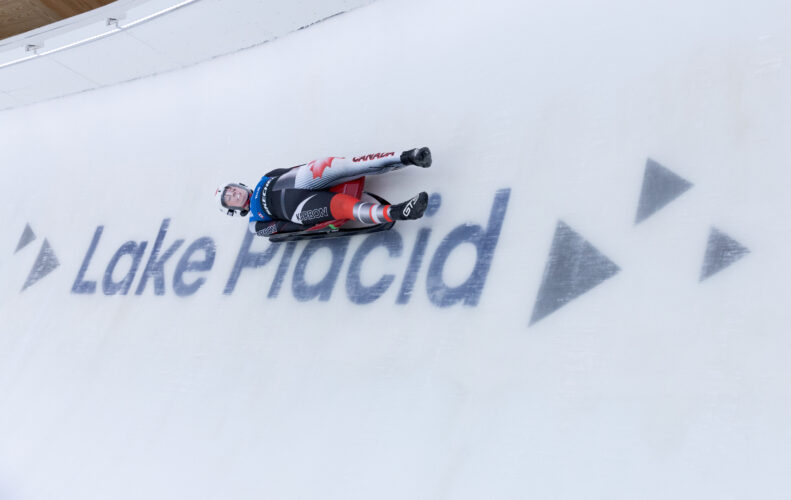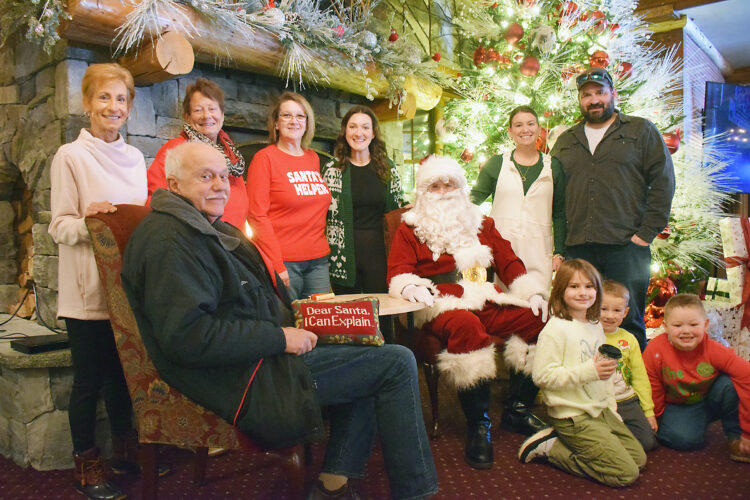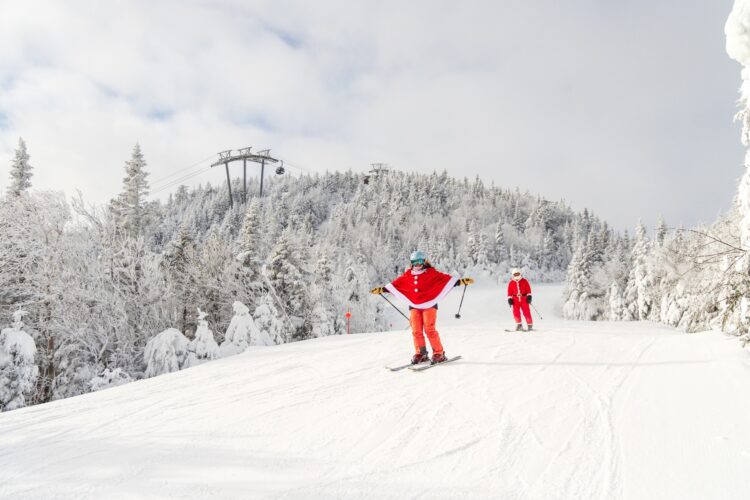Ironman contract signed for another 3 years
- Volunteers peel wetsuits off an Ironman Lake Placid athlete after the 2.4-mile swim on Mirror Lake in July 2023. (News photo — Andy Flynn)
- Ironman Lake Placid athletes make their 2.4-mile swim on Mirror Lake in July 2023. (News photo — Andy Flynn)

Volunteers peel wetsuits off an Ironman Lake Placid athlete after the 2.4-mile swim on Mirror Lake in July 2023. (News photo — Andy Flynn)
LAKE PLACID — The Ironman Lake Placid triathlon will continue through at least 2027.
The Lake Placid Village Board of Trustees voted unanimously on Monday, May 20 to authorize Mayor Art Devlin to sign a three-year contract extension with Ironman. This vote followed the North Elba Town Council’s unanimous approval of the contract on May 14. With signatures from Devlin, North Elba town Supervisor Derek Doty, the Regional Office of Sustainable Tourism and the Ironman Group, the contract will be put into effect.
The contract extension sets race dates for the next three years — July 20, 2025, July 19, 2026 and July 25, 2027 — and alters the responsibilities of race organizers as well as ROOST and local governments, including greater financial obligations on both sides.
This year’s Ironman will be the race’s 25th anniversary in Lake Placid; it was launched in 1999, and the 2020 race was canceled due to the coronavirus pandemic. The triathlon is set for Sunday, July 21 and has around 2,600 registrants.
Contract

Ironman Lake Placid athletes make their 2.4-mile swim on Mirror Lake in July 2023. (News photo — Andy Flynn)
The 25-page 2025-27 Ironman contract obtained by the Adirondack Daily Enterprise is similar to the previous agreement, but contains several amendments intended to “better align (the contract) with … current business objectives and practices.” Some of these changes include increasing the marketing fees ROOST pays to Ironman’s overarching corporation, World Triathlon Corporation, or WTC; granting local leadership input into the amount of race participants; and requiring the Ironman Foundation, which is a separate entity from WTC, to set aside funds for community grants.
ROOST is contractually required to pay WTC “marketing fees.” In the 2022-24 contract, these fees amounted to $90,000 annually, split into three $30,000 payments. The 2025-27 contract increases these fees to $110,000 annually, split into one $30,000 and two $40,000 payments. The contract does not contain an explanation for the fee hike.
Ironman has new financial obligations in the contract, as well. Beginning in 2025, the Ironman Foundation — which is a separate entity from WTC — will donate “a minimum of $40,000 to be used for the volunteers of the event and $10,000 to be used solely for community grants to local area non-profit organizations.” WTC will also be required to pay a minimum of $35,000 towards the Ironman “dine around” voucher program.
Following the race, the town and village governments and ROOST will have seven days to meet with WTC and determine a maximum number of participants for the next year’s race. The 2025 race is already capped at 2,500 registrants, according to the contract.
WTC will now need to give the town, village and ROOST eight months’ notice of race cancellation. Also removed was a clause that allowed WTC to require the town, village and ROOST to contract their affiliated or preferred vendors for services like race timing, registration and photography.
Under the previous contract, ROOST was required to provide WTC 13 hotel rooms for a combined 100 nights at no cost. The new contract still requires 13 rooms but limits the stays to five nights each, amounting to 35 fewer nights. ROOST is still required to provide WTC use of the Lake Placid Olympic Conference Center and will also now be required to contribute $18,000 toward rental charges for any additional facilities.
ROOST and the village will no longer have to provide WTC use of 40% of the Main Street public parking lot next to the conference center, freeing up some parking along Main Street. As in the previous contract, WTC will be responsible for paying for State Police presence at the event, while the village will provide village police and volunteer firefighters.
WTC and ROOST are also contractually obligated to “work together on a transition plan for a race director and volunteer director, (whom) shall be mutually agreed upon by WTC and ROOST.” Greg Borzilleri, the current race director, said that this clause was added “in case I get hit by a bus or something.”
“I think I can survive (as race director) until I’m probably 85 years old,” he said.
Carried over from the previous contract is a confidentiality policy that requires the entities that sign the contract to “not use or disclose, directly or indirectly, any of the terms of this agreement” while the contract is in place and during a 36-month period afterward. It also requires the same parties to “provide reasonable advance written notice” to the other groups if one of them is required to disclose any “confidential information” in order to “comply with applicable law, regulations, court order or other legal process,” which could include Freedom of Information Law requests.
Kristin O’Neill, deputy director and counsel for the state Committee on Open Government, told the News in 2022 that “no vendor that does business in the state of New York — or really any government agency — can have the expectation that its entire contract is going to remain in secret.”
Task force
The new contract gives the Major Events Committee — formerly the Ironman Task Force — greater input into how the race is organized and managed. According to a former committee member who asked not to be named for fear of retribution, the membership of the current committee is ideologically different from the original task force. Most people who disagreed with ROOST elected to leave, as they felt their opinions were not being taken seriously, the former member said.
“The committee is not a true representative of the community’s feeling,” they said. “A committee should be formed of people that have differing opinions … and that didn’t happen in that committee.”
While the previous contract required WTC to “make reasonable best efforts to address and resolve any known recommendations” from the committee, the new contract states that WTC must support ROOST’s community outreach efforts regarding the race.
In January 2022, the Ironman Task Force — a group of residents, business owners and local sports leaders appointed by local governments and ROOST — called for five main changes to the triathlon: establishing a point of contact for race day, creating a campaign to address road safety in the lead-up to the race, devising materials to highlight race communities and local businesses, developing ways to help locals avoid areas of congestion on race day and forming a communication plan between the community and race organizers.
According to ROOST Chief Operating Officer Mary Jane Lawrence, all of these changes have been made.
The position of community liaison was established for the 2022 race; this liaison is a point person for locals regarding the race. Lawrence said that there will be a new liaison this year. This person has not been officially chosen yet. Both a spectators’ and an athletes’ code of conduct have been created, as well as maps for alternate bike routes on race day, “share the road” messaging and materials that highlight the towns and businesses along the race route.
Major Events Committee member Sue Burdick Young said that traffic and athlete and spectator conduct have gotten better in the past couple of years.
“In general, last year was better,” she said. “It’s not to the level that I’d like to see it, but there’s definitely been some improvement.”




